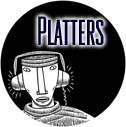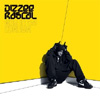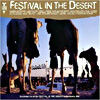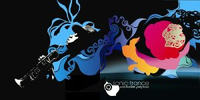
Comment
on this story
|
 |

Hip hop's new wunderkind, desert dancing, and a jazz neocon

Dizzee Rascal
Boy in da Corner (Matador)
Can someone find me the last pop musician to be granted a half-page front-of-section spread in the Sunday New York Times, complete with four-column color photo, five weeks before his first album appeared?
2003 was that kind of year for 19-year-old Dylan Mills. Boy in da Corner's American release date is Jan. 20, but it's been out in the U.K. since July (it went gold), and it made half the U.S. year-end best-of lists anyway. Mills, aka Dizzee Rascal, is the most interesting pop voice of the moment, and not only because he provides a template for actual British hip-hop in a way that no one else has.
A product of the U.K. garage scene (think: hard dance beats and pirate radio stations) and, more broadly, the young black British underclass (think: public housing, gangs, racist cops), he also has a liberal taste for jarring noise (think: his favorite album, Nirvana's In Utero).
He raps fast, about ruff gyals and tuff bwoys and sitting 'round wondering what it's all about. His slang is East London gangsta, and as a vocalist he comes sweet, solemn, savage and show-off, often in the same verse. His arrangements are dank and clanky, techno-paranoid and dub weird. Some of the beats might work on a dancefloor, but mostly it's hard to imagine doing much to this music except kind of sitting there wondering what planet you're on.
The album has plenty of standouts, but try starting with "Stop Dat." It's a war writ small: phantom-of-the-opera synths, demon shrieks, air-raid sirens and chromatic scales from Neptune backing up mad rants about butterfly knives and Fred Flintstone. If you make it through that, you might be ready for "I Luv U"—which he wrote when he was 16.
—Jesse Fox Mayshark

Various Artists
Festival In The Desert (World Village)
Festival in the Desert is a veritable musical passport. It is a live recording so well preserved it feels as though the performances are being piped in from Timbuktu, via satellite, to your very own sound system. This recording practically puts a listener at front-row-center. Festival in the Desert is one of the best concert recordings period and it most certainly can be considered to be one of the most novel live shows ever.
A three-day affair that occurred at the crossroads where mighty African empires flourished, where Islam made deep in-roads into the continent, where cross-ethnic problems persist, and where ecological fragility is at its most apparent, African musicians cavorted with their Western guests to create a magical musical experience. The African Blues of Ali Farka Toure and the discerning music of Oumou Sangare shared a stage with Led Zeppelin's Robert Plant and the musings of Italian classical musician Ludovico Einaudi, and his partner Ballake Sissoko.
Festival in the Desert—besides having served as a traditional gathering of the Tuareg and as an event that hosted camel races, a camping-out jamboree, and an arts & crafts fair—fulfills its role as an acoustical dispatch from Africa's hinterland. At a venue open to the African sky and at an event pollinated with African folk songs, a serving of the Blues, a dabbling of Francophone hip-hop, and a sparkling of Native-American rock, troubadours, artisans, nomads, and cosmopolites seemingly frolicked to their hearts' delight, so much so as to make anyone with a subscription to a travel magazine jealous.
—Ekem Amonoo Lartson

Nicholas Payton
Sonic Trance (Warner)
Imagine an arch right wing Republican abruptly presenting as a far left wing Democrat. Whatever the intent—disguise, change in conviction, calculated political makeover—the likely, if not inevitable, outcome is parody.
Trumpeter Nicholas Payton is the just-still twenty-something leader among equals watching over jazz's neoconservative flame, said flame having been lit a quarter of century ago by Wynton Marsalis, grand pooh-bah of the repertory, jazz-as-chamber-music, Louis-Armstrong-as-saint, vanguard. Payton's last CD, entitled Dear Louis, followed the neocon script, a genuflecting homage to legendary Armstrong.
That was then. Now, Sonic Trance finds Payton following in the footsteps of a rather different trumpeter, the neocons' antichrist, latter-day Miles and his issue. Undoubtedly the most abstract recording of Payton's young career, Trance adds Kevin Hays on keyboards, Karriem Riggins on sampler/synthesizer, and Vincente Archer on bass to his usual collaborators saxophonist Tim Warfield and drummer Adonis Rose. The result is a collage of 18 concepts rather than specific tunes, as well as near-conventional melodies with fine soloing.
Trance flirts dangerously with the derivative, most manifestly by attenuating Payton's ordinarily bold sound through samples, wah-wah, etc., at times evoking the leaner Hassell, Molvaer, and Miles similarly embedded in electronica. And while this unexpected offering of imitation, tongue-in-cheek, and audacity does not entirely succeed, only narrowly evading the "p" word, it does suggest fertile ground for further exploration.
—Jonathan B. Frey

January 22, 2003 * Vol. 14, No. 4
© 2004 Metro Pulse
|